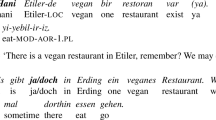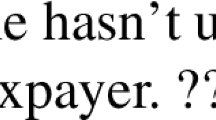Abstract
This paper investigates the semantics of derived statives, deverbal adjectives that fail to entail there to have been a preceding (temporal) event of the kind named by the verb they are derived from, e.g. darkened in a darkened portion of skin. Building on Gawron’s (The lexical semantics of extent verbs, San Diego State University, ms, 2009) recent observations regarding the semantics of extent uses of change of state verbs (e.g., Kim’s skin darkens between the knee and the calf) and Kennedy and Levin’s (Measure of change: The adjectival core of degree achievements, Oxford University Press, Oxford, 2008) theory of change, it is shown, contrary to previous analyses, that a fully compositional semantic analysis is possible, and thus that there is no argument from derived statives for word formation differing from semantic composition above the word level in requiring deletion operations, as in Dubinsky and Simango’s (Passive and stative in Chichewa, Language 72:749–781, 1996) analysis. Further, such an analysis, by contrast with previous ones, both compositional (Jackson in Resultatives, derived statives, and lexical semantic structure, Doctoral dissertation, UCLA, 2005b; Condoravdi and Deo in Proceedings of the 18th International Congress of Linguists (CIL 18), Seoul, 2008) and non-compositional (Dubinsky and Simango 1996), correctly predicts, as shown by a range of arguments, that the meaning of the derived stative contains the meaning of the verb it is derived from and that it therefore contrasts fundamentally with morphologically simple adjectives in the kind of meaning that it has.
Similar content being viewed by others
References
Alexiadou A., Anagnostopoulou E. (2008) Structuring participles. In: Chang C.B., Haynie H.J. (eds) Proceedings of the 26th West Coast Conference on Formal Linguistics.. Somerville MA, Cascadilla Proceedings Project, pp 33–41
Alexiadou A., Anagnostopoulou E., Schäfer F. (2006) The properties of anti-causatives crosslinguistically. In: Frascarelli M. (eds) Phases of interpretation. Mouton de Gruyter, Berlin, pp 187–211
Chierchia G. (1989) Structured meanings, thematic roles and control. In: Chierchia G., Partee B.H., Turner R. (eds) Properties, types and meaning.. Kluwer, Dordrecht, pp 131–166
Chierchia, G. (2004). A semantics for unaccusatives and its syntactic consequences. In A. Alexiadou, E. Anagnostopoulou, & M. Everaert (Eds.), The unaccusativity puzzle (pp. 22–59). Oxford: Oxford University Press. [Previously circulated as unpublished 1989 Cornell University manuscript.]
Condoravdi, C., & Deo, A. (2008). Aspect shifts in Indo-Aryan. In Proceedings of the 18th International Congress of Linguists (CIL 18): Workshop on formal approaches to the relation of tense, aspect and modality. Seoul.
Cresswell M.J. (1985) Structured meanings: The semantics of propositional attitudes. MIT Press, Cambridge, MA
DeLancey S. (1984) Notes on agentivity and causation. Studies in Language 8: 181–213
Deo, A. (2006). Tense and aspect in Indo-Aryan languages: Variation and diachrony. Doctoral Dissertation, Stanford University, Stanford, CA.
Dixon R.M.W. (1982) Where have all the adjectives gone?: And other essays in semantics and syntax. Mouton, The Hague
Doron, E. (2009). The interaction of adjectival passive and voice. Handout of talk given at Stanford University, February 17, 2009.
Dowty D. (1979) Word meaning and Montague grammar. D. Reidel Publishing, Dordrecht
Dowty D. (2007) Compositionality as an empirical problem. In: Barker C., Jacobson P. (eds) Direct compositionality.. Oxford University Press, Oxford, pp 23–101
Dubinsky S., Simango S.R. (1996) Passive and stative in Chichewa: Evidence for modular distinctions in grammar. Language 72: 749–781
Embick D. (2004) On the structure of resultative participles in English. Linguistic Inquiry 35: 355–392
Embick, D. (2009). Roots, states, stative passives. Handout of talk presented at Roots, Stuttgart, June 11, 2009.
Gawron, M. (2009). The lexical semantics of extent verbs. San Diego State University, ms., January 31, 2009.
Grimshaw J. (1982) On the lexical representation of Romance reflexive clitics. In: Bresnan J. (eds) The mental representation of grammatical relations. MIT Press, Cambridge, MA, pp 87–148
Härtl H. (2003) Conceptual and grammatical characteristics of argument alternations: The case of decausative verbs. Linguistics 41: 883–916
Jackson, E. (2005a). Derived statives in Pima. Handout of talk given at SSILA, January 7, 2005.
Jackson, E. (2005b). Resultatives, derived statives, and lexical semantic structure. Doctoral Dissertation, University of California, Los Angeles, Los Angeles, CA.
Jaxontov S.J. (1988) Resultative in Chinese. In: Nedjalkov V.P. (eds) Typology of resultative constructions. John Benjamins, Amsterdam, pp 113–133
Kallulli, D. (2006). On unaccusative morphology and argument realization. University of Vienna.
Kearns K. (2000) Semantics. Macmillan Press, London
Kennedy C. (1999) Projecting the adjective: The syntax and semantics of gradability and comparison. Garland, New York
Kennedy C. (2007) Vagueness and grammar: The semantics of relative and absolute gradable adjectives. Linguistics and Philosophy 30: 1–45
Kennedy C., Levin B. (2008) Measure of change: The adjectival core of degree achievements. In: McNally L., Kennedy C. (eds) Adjectives and adverbs: Syntax, semantics, and discourse. Oxford University Press, Oxford, pp 156–182
Kennedy C., McNally L. (2005) Scale structure, degree modification, and the semantics of gradable predicates. Language 81: 345–381
Kim, Y. (2008). Topics in the phonology and morphology of San Francisco del Mar Huave. Doctoral Dissertation, University of California, Berkeley, Berkeley, CA.
Koontz-Garboden A. (2005) On the typology of state/change of state alternations. Yearbook of Morphology 2005: 83–117
Koontz-Garboden, A. (2006). The states in changes of state. In Proceedings of the 32nd annual meeting of the Berkeley Linguistics Society, Berkeley, CA.
Koontz-Garboden A. (2008) Monotonicity at the lexical semantics–morphosyntax interface. In: Elfner E., Walkow M. (eds) Proceedings of the 37th Meeting of the North East Linguistic Society. Amherst, MA, GLSA, pp 15–28
Koontz-Garboden A. (2009a) Anticausativization. Natural Language and Linguistic Theory 27: 77–138
Koontz-Garboden A. (2009b) Ulwa verb class morphology. International Journal of American Linguistics 75: 453–512
Koontz-Garboden, A. (2010). Only some lexical semantic roots are morphological roots. Paper presented at annual meeting of the Linguistic Association of Great Britain, Leeds, September 3, 2010. https://doi.org/personalpages.manchester.ac.uk/staff/andrewkg/cos-roots-ho-2-sept.pdf.
Koontz-Garboden, A. (to appear). The monotonicity hypothesis. In L. McNally & V. Demonte (Eds.), Telicity, change, and state: A cross-categorial view of event structure. Oxford: Oxford University Press.
Koontz-Garboden, A., & Beavers, J. (2011). Manner and result in the roots of verbal meaning. The University of Manchester and The University of Texas at Austin, ms.
Kratzer, A. (2000). Building statives. In Proceedings of the 26th Meeting of the Berkeley Linguistics Society (pp. 385–399). Berkeley, CA: Berkeley Linguistics Society.
Krohn, L. (2008). The manner/result complementarity and verbs of the manner of death. Unpublished undergraduate Grammatical Semantics Class Essay, The University of Manchester.
Langacker, R. (1986). Abstract motion. In Proceedings of the 12th Annual Meeting of the Berkeley Linguistics Society (pp. 455–471). Berkeley, CA: Berkeley Linguistics Society.
Levin B. (1993) English verb classes and alternations: A preliminary investigation. University of Chicago Press, Chicago, IL
Levin, B., & Rappaport Hovav, M. (2003). Roots and templates in the representation of verb meaning. Handout of talk at the Department of Linguistics, Stanford University, May 15, 2003.
Mačavariani M.V. (1988) Stative, resultative, passive, and perfect in Georgian. In: Nedjalkov V.P. (eds) Typology of resultative constructions, English translation edited by B. Comrie. John Benjamins, Amsterdam, pp 259–275
Marantz, A. (1997). No escape from syntax: Don’t try morphological analysis in the privacy of your own lexicon. In Proceedings of the 21st Annual Penn Linguistics Colloquium (pp. 201–225). Volume 4.2 of University of Pennsylvania Working Papers in Linguistics.
Mateu, J. (2009). Events in non-verbal domains: A DM-based approach. Handout of talk given at Events across categories: Theoretical and experimental approaches to event structure. Madrid, 27–28 May 2009.
Matsumoto Y. (1996) Subjective motion and English and Japanese verbs. Cognitive Linguistics 7: 183–226
Mchombo S. (1993) A formal analysis of the stative construction in Bantu. Journal of African Languages and Linguistics 14: 5–28
Mchombo S. (2004) The syntax of Chichewa. Cambridge University Press, Cambridge
Meltzer, A. (2009). Adjectival passives in hebrew: Evidence for parallelism between the adjectival and verbal systems. Tel Aviv University, ms. lingBuzz/000907.
Nedjalkov I.V., Nedjalkov V.P. (1988) Stative, resultative, passive, and perfect in Evenki. In: Nedjalkov V.P. (eds) Typology of resultative constructions, English translation edited by B. Comrie. John Benjamins, Amsterdam, pp 241–257
Nedjalkov, V.P. (eds) (1988) Typology of resultative constructions. John Benjamins, Amsterdam
Nedjalkov V.P., Inenlikey P.I., Raxtilin V.G. (1988) Resultative and perfect in Chukchee. In: Nedjalkov V.P. (eds) Typology of resultative constructions. John Benjamins, Amsterdam, pp 153–166
Nedjalkov V.P., Jaxontov S.J. (1988) The typology of resultative constructions. In: Nedjalkov V.P. (eds) Typology of resultative constructions. John Benjamins, Amsterdam, pp 3–62
Perel’muter I.A. (1988) Stative, resultative, passive, and perfect in Ancient Greek (Homeric Greek). In: Nedjalkov V.P. (eds) Typology of resultative constructions, English translation edited by B. Comrie. John Benjamins, Amsterdam, pp 277–287
Piñón C. (2008) Aspectual composition with degrees. In: McNally L., Kennedy C. (eds) Adjectives and adverbs: Syntax, semantics, and discourse.. Oxford University Press, Oxford, pp 183–219
Pustejovsky, J. (1992). The syntax of event structure. In B. Levin & S. Pinker (Eds.), Lexical and conceptual semantics (pp. 47–82). Cambridge, MA: Blackwell [Reprinted from Cognition 41].
Pustejovsky J. (1995) The generative lexicon. MIT Press, Cambridge, MA
Ramchand G.C. (2008) Verb meaning and the lexicon: A first-phase syntax. Cambridge University Press., Cambridge
Rappaport Hovav M., Levin B. (1998) Building verb meanings. In: Butt M., Geuder W. (eds) The projection of arguments: Lexical and compositional factors. CSLI Publications, Stanford, CA, pp 97–134
Reinhart T. (2002) The theta system: An overview. Theoretical Linguistics 28: 229–290
Reinhart T., Siloni T. (2005) The lexicon-syntax parameter: Reflexivization and other arity operations. Linguistic Inquiry 36: 389–436
Rothstein S. (2004) Structuring events. Blackwell, Oxford
Saxton D., Saxton L., Enos S. (1983) Tohono O’odham/Pima to English, English to Tohono O’odham/Pima dictionary (2nd edn). The University of Arizona Press, Tucson, AZ
Smith, M. (2006). Canalization of causative derivations. Paper presented at 2006 meeting of LSA, Albuquerque, New Mexico.
Talmy L. (2000) Towards a cognitive semantics, volume 1: Concept structuring systems. MIT Press, Cambridge, MA
Wasow T. (1977) Transformations and the lexicon. In: Culicover P., Wasow T., Akmajian A. (eds) Formal syntax.. Academic Press, New York, pp 327–360
Author information
Authors and Affiliations
Corresponding author
Rights and permissions
About this article
Cite this article
Koontz-Garboden, A. The lexical semantics of derived statives. Linguist and Philos 33, 285–324 (2010). https://doi.org/10.1007/s10988-011-9082-9
Published:
Issue Date:
DOI: https://doi.org/10.1007/s10988-011-9082-9




